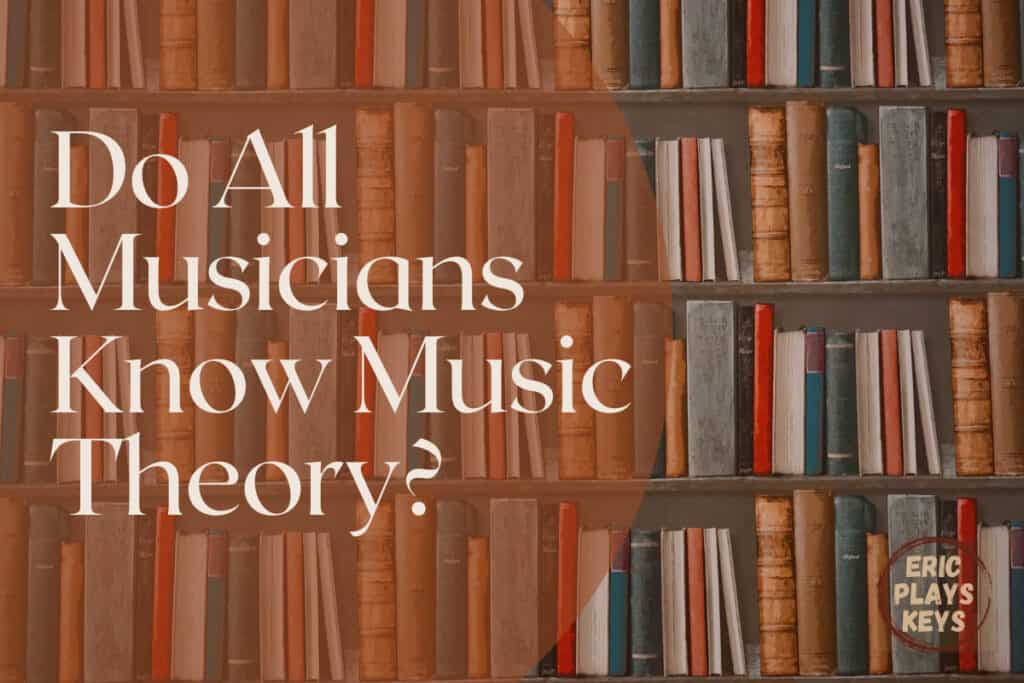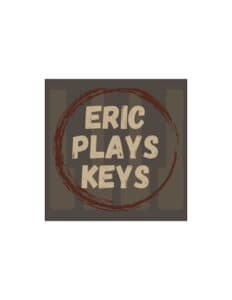
Many music students will hear that music theory is a critical aspect of learning to play an instrument. It’s common to wonder how many musicians have actually taken this advice seriously, and how many have had success skipping their music theory studies.
Not all musicians know music theory. However, it’s common for good musicians, especially professionals, to have a moderate to deep understanding of music theory. That being said, there are still musicians of all levels who do not know any music theory at all.
There’s lots of variability between musicians and their music theory competency. In addition, music theory is a broad subject, so some musicians may utilize some subtopics more than others. In this article, I’ll go more into depth about these distinctions.
Knowledge of Music Theory Varies Widely
There are tons of musicians who have in depth knowledge of music theory, many that couldn’t care less, and everything in between. For good musicians, most important thing on their mind is actually learning and playing their instruments – you’ll find this is a lot more consistent between musicians than their music theory knowledge.
This does not mean that music theory doesn’t help with musicianship and playing. In many cases, music theory is an extremely useful supplement to musicians’ ability to understand the music they’re making, and boosts their overall ability. However, this is not always the case – some musicians progress well with minimal music theory knowledge, preferring to play by ear and use their natural instincts.
Some musicians actually despise music theory and avoid it at all costs. It’s hard to say whether this is a detrimental opinion or not – especially because a percentage of these people are great players. Would they be better if they studied the subject a little bit? Maybe – but there’s no way to know for sure.
In addition, musicians’ knowledge of different subtopics of music theory varies as well. For example, major and minor chords are extremely common knowledge, while the Italian terms for various tempos are more niche. Although the names of basic chords are accepted by most as ‘need to know’, many musicians get by without knowing the relationships between chords, and why certain chords are often grouped together. In these cases, they use their ears to determine chords they like and are still able to play. Terminology about song form, including terms like chorus, verse, and bridge are also known by most musicians.
Which Musicians Don’t Know Music Theory
It’s very difficult to identify famous musicians who don’t know music theory, because they may actually know more than the online sources claim. I won’t claim to know specific musicians who fall into this category because it’s difficult to verify.
However, it’s safe to say that self-taught musicians likely don’t know too much music theory. This includes the Beatles, Jimi Hendrix, Kurt Cobain, and Thelonius Monk. My guess is that as their careers progressed, they began to pick up some basic music theory principles because it’s hard to avoid forever.
Which Musicians Know Music Theory
Professional musicians are a lot more likely to know music theory than amateurs and students. Usually, as musicians progress to more advanced stages, they learn music theory as a supplement to their skills. Studio and session musicians always know music theory and it’s required to read and understand music as part of the job. In rare cases, rock and pop musicians can be very successful without music theory knowledge.
A lot of amateurs and students do actually learn some music theory, but forget most of it. The only things that stick are the topics that are most practical and used often. Since it’s possible to play music without knowing any music theory, sometimes all of these studies are lost. Most of the time, some basic knowledge of chords is retained.
Genre will also influence the percentage of musicians who know music theory. In classical music, music theory training is widely accepted as essential, and every classical musician will be at least moderately trained. In jazz, musicians have to have an intimate knowledge of chords, chord tones, and scales to improvise. They may not know the music theory terms for these concepts, however. In genres like rock and pop, it’s more common for musicians to not know any.
Knowledge of music theory will also vary by instrument. Piano and guitar players more commonly have solid background in chords and scales. Drummers usually have some knowledge about the terminology for rhythms. Singers sometimes don’t know a single thing about the song they’re performing apart from their melody and lyrics.
Finally, self-taught musicians are much more likely to skip music theory training than those who took lessons. Since music theory is an academic discipline, it’s usually enforced by teachers, although not always.
How to Tell If a Musician Knows Music Theory or Not
Sometimes you can actually tell if a musician knows music theory by listening to their music. This is not an exact science, but it can be useful.
If musicians are playing songs with complex chords and chord changes, it’s likely that they were trained in music theory. It’s very rare for a musician to be able to create uncommon harmonies completely on their own – a more likely explanation is that they came across those chords and progressions during their studies.
Another tell-tale sign of music theory knowledge is if they play in different time signatures. Almost all western music is in 4/4 time, so if the musician is playing in 3, 5, 7, etc. it’s likely they learned these time signatures as part of their studies.
Note that these signs are related to the complexity of the music – this quality is completely separate from quality of music. The quality of music is subjective, and musicians of all music theory skill levels make music of all levels of quality (yes, including terrible).
How Much Music Theory Do I Know
I thought I’d provide a little bit about my own music theory knowledge and training here for those that may be interested. Personally, I have extensive music theory training stemming from years of piano lessons, formal music theory classes from my piano teacher and school, and my own self-taught investigations online. I believe music theory is valuable for supplementing my piano skills, but also recognize that practicing my instrument is more important.
I spend the most time learning about chords and harmony. This helps me understand how songs are constructed, and how to play the correct chords on the piano. I’m also able to improvise my own embellishments and insert additional chord changes to songs by applying the patterns I’ve seen and understanding how the notes that make up chords function.
I’ve also picked up all the commonly used terminology needed to communicate with bandmates over the years. This is important for gigging and rehearsing, as it allows everyone to get on the same page about our material.
When I write and arrange songs for various groups I play with, my knowledge of reading sheet music comes in handy as well. Knowing the various symbols, note symbols, rest symbols, etc. is key to writing legible music for my bandmates to play.
From my classical lessons as a kid, I learned all of the latin terminology and fancy names for chord progressions, rhythms, song structures, etc. I still somewhat remember these things, and I appreciate them, although I will probably slowly forget these things as the years go on.
Does All Music Follow Music Theory?
All music follows music theory, although not necessarily on purpose. Music theory can be applied to explain all music, regardless of whether traditional music theory conventions were considered during the composition and/or performance.
A lot of music is written without regard to music theory, but music theory can always be utilized to explain that music. This is because most music is written to be pleasant on the ear or to communicate certain ideas that aren’t completely original in nature. There’s only so many ways to make music, so repeated elements of music have almost always been analyzed and categorized by music theory.
For example, it’s pretty tough to write a song that doesn’t have chords, a melody, notes, or rhythm – I can’t even imagine how something called music could avoid these elements. Therefore, music theory will be able to classify the elements of the music.
Sometimes music theory will deviate from music theory conventions – it will not include repeating rhythms, or place notes together that aren’t ‘supposed’ to be together. However, music theory has terms for these instances (free time, and dissonance). This parallels the English language; in instances when speech does not follow established grammatical norms, it’s called slang or colloquialism.
